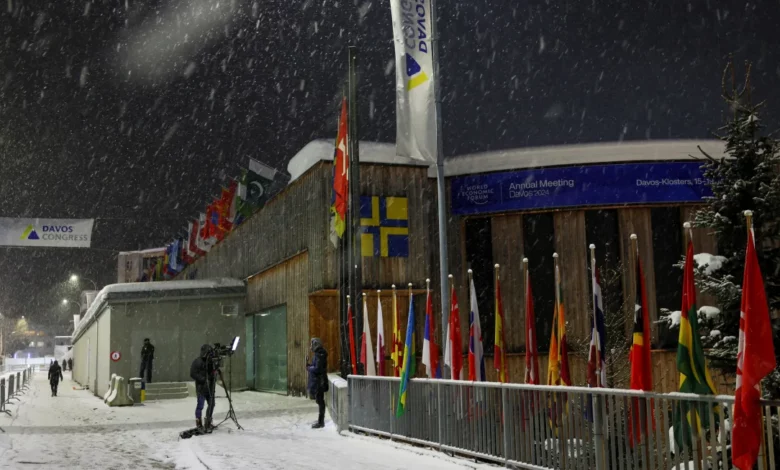
This year, more than 60 heads of state, including Israeli President Isaac Herzog, Ukrainian President Volodymyr Zelensky, French President Emmanuel Macron and China’s second-in-command Li Qiang, will be in attendance. The United States is also sending Secretary of State Antony Blinken, National Security Adviser Jake Sullivan and Special Presidential Envoy for Climate John Kerry.
Business executives include Microsoft CEO Satya Nadella, OpenAI CEO Sam Altman, JPMorgan Chase CEO Jamie Dimon, Bank of America CEO Brian Moynihan and BlackRock CEO Larry Fink, to name a few.
Here’s what we’ll be watching for as the world’s biggest influencers hobnob.
The world votes: With several major countries approaching pivotal elections this year (half the world’s population is going to the polls in 2024), leaders are concerned about how these events might reshape international alliances and economic policies.
Of particular interest are the Republican primaries in the United States and how Donald Trump, who won the first GOP contest of 2024 in Iowa last night, might fare.
“It is a threat, it is something that worries people to a great extent, but it can also be perhaps a wake-up call (for Europe),” BlackRock vice chairman Philipp Hildebrand told CNN’s Richard Quest on Monday of Trump’s run for reelection.
This year also brings important elections in Taiwan, India and Mexico.
Climate catastrophes: Climate change is a hot topic as leaders meet to discuss balancing economic growth with sustainability.
Davos comes just days after scientists around the globe reported that the average temperatures last year reached a new record high. That change has propelled the world just hundredths of a degree away from a critical climate threshold.
The WEF’s Global Risks report, published last week, found climate change to be one of the biggest risks facing the world.
The report also said that cooperation among global leaders on the issue is scarce. So while leaders will likely discuss the use of fossil fuels and green development, there may not be much agreement.
The WEF, meanwhile, said that an increase in extreme weather events, including rising temperatures and rampant floods and wildfires, could lead to a “global catastrophe” within 10 years.
A decade of wasted opportunity: In a world still recovering from the pandemic’s economic shocks and with income inequality startlingly high, the global economy will likely be the most-discussed topic.
The World Bank said last week that the global economy is likely to slow to its worst half decade of growth in the past 30 years. Without “a major course correction,” the bank said, this will be “a decade of wasted opportunity.”
“It’s going to be very difficult to make money,” Nicolai Tangen, the CEO of Norges Bank, which manages Norway’s $1.4 trillion government pension fund and calls itself the world’s biggest single investor in the stock market, told CNN’s Quest at Davos.
“I think inflation will be difficult to kill off and we are seeing wage increases in many parts of the world. You see the climate impacting inflation now, you see transport routes being impacted, geopolitics is not great, so it doesn’t look particularly good,” he said.
Disappearing jobs: Artificial intelligence’s potential to transform economies and its ethical implications will be another focal point this week.
Almost 40 percent of jobs around the world could be affected by the rise of AI, a trend that is likely to deepen inequality, according to the International Monetary Fund.
In a Sunday blog post, IMF chief Kristalina Georgieva called for governments to establish social safety nets and offer retraining programs to counter the impact of AI.
“In most scenarios, AI will likely worsen overall inequality, a troubling trend that policymakers must proactively address to prevent the technology from further stoking social tensions,” she wrote ahead of the WEF meeting, where the topic is set to be high on the agenda.
Concerns over AI disrupting elections, meanwhile, also topped the list of the biggest risks for 2024, according to a WEF report.
OpenAI’s Altman and Microsoft’s Nadella will speak at Davos as part of a program that includes a debate on whether generative AI can spark another industrial revolution.
Geopolitical tensions: With conflict in Europe and the Middle East and growing tensions between the United States and China, geopolitics will be another major topic of conversation.
Leaders gathered in Davos Sunday to discuss Ukrainian President Zelensky’s 10-point peace plan to end Russia’s war with his country. Zelensky is expected to give a speech later Tuesday and meet with JPMorgan’s Dimon.
Israeli President Herzog, meanwhile, will participate in a conversation about “achieving security and cooperating in a fractured world,” with US Secretary of State Blinken and WEF executive chairman Klaus Schwab later this week.
The wealth of the world’s five richest men has more than doubled since 2020
The five wealthiest people on Earth have become a whole lot richer in recent years, reports my colleague Tami Luhby.
Since 2020, the net worths of Tesla CEO Elon Musk, LVMH CEO Bernard Arnault, Amazon founder Jeff Bezos, Oracle co-founder Larry Ellison and Berkshire Hathaway CEO Warren Buffett have skyrocketed by 114% to a collective total of $869 billion after taking inflation into account, according to Oxfam’s annual inequality report, released Sunday.
If current trends continue, the world could see its first trillionaire in a decade.
At the same time, nearly 5 billion people globally have become poorer, as they contend with inflation, war and the climate crisis. It would take nearly 230 years to eliminate poverty based on the current trajectory.
Though inequality is on the rise, there are some bright spots, said Nabil Ahmed, Oxfam America’s director of economic and racial justice. Workers have been flexing their muscle through strikes and deals that better their compensation and working conditions. Also, some governments have been on their side, pushing policies aimed at strengthening workers’ rights.
“We find ourselves in a new Gilded Age, but workers, regulators and union and community organizers are starting to make cracks in it,” Ahmed said.
Why Americans are buying a lot less Champagne
Champagne sales lost some of their pop in 2023 following a few record-breaking years of sales spurred by the end of Covid-19 lockdowns, reports my colleague Jordan Valinsky.
Comité Champagne, a trade association representing more than 16,000 winegrowers and 320 Champagne houses, said in a new report that total shipments last year of bubbly from France fell to 299 million bottles, a decline of 8.2% compared to 2022.
That marks nearly a return to pre-Covid levels in 2019, when 297.3 million bottles were shipped. During its peak in 2022, sales soared by 33%, when 325 million bottles were shipped.
But don’t cry for Moët. Although total shipments fell, the financial fortunes for many Champagne houses were less affected because they sold more expensive labels, thus enabling them to maintain their sales above €6 billion ($6.6 billion) for another year, Comité said in a release.




